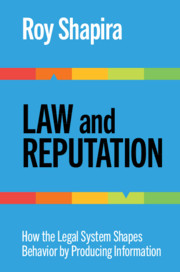Introduction
Published online by Cambridge University Press: 23 August 2020
Summary
Back in 2009 when I was starting my doctoral studies, I sat through my first ever law and economics seminar. Two of the field’s founding fathers – Polinsky and Shavell – were presenting their proposal to abolish product liability. A heated debate over the outcomes ensued in the room: how abolishing liability could affect access to justice or distribution. But I was still stuck on the logic, namely, how Polinsky and Shavell treated reputation as an alternative to the legal system. Manufacturers, their argument went, will invest in the quality and safety of their products even without the threat of legal liability, simply because they care about maintaining their reputation. And in markets where these nonlegal (reputational) forces are strong enough, it is not cost-effective to keep a costly adjudication system merely for the sake of an incremental contribution to deterrence.
- Type
- Chapter
- Information
- Law and ReputationHow the Legal System Shapes Behavior by Producing Information, pp. 1 - 16Publisher: Cambridge University PressPrint publication year: 2020

